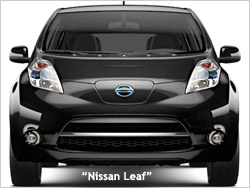 The bad news for automakers putting marketing muscle
behind electric vehicles (EVs) is that they won't be more than a sliver of the U.S. auto market, at least until companies cut prices and convince consumers that such cars' longer-term benefits more
than make up for the price premium.
The bad news for automakers putting marketing muscle
behind electric vehicles (EVs) is that they won't be more than a sliver of the U.S. auto market, at least until companies cut prices and convince consumers that such cars' longer-term benefits more
than make up for the price premium.
Compared with sales prices for similar gasoline-powered vehicles, all-electric vehicles carry a premium of $10,000, on average, while
plug-in hybrid electric vehicles carry a $16,000 premium, on average, per J.D. Power and Associates’ new -- and first-ever -- Electric Vehicle Ownership Experience Study. Based on annual fuel
savings, it would take an average of 6.5 years for EV owners to recoup the $10,000 premium, while the payoff point for plug-in hybrid ownership is 11 years.
advertisement
advertisement
The study, which
looks at EV shopping, consideration and ownership experience, finds that nearly half of current EV owners say they are still mostly driven by a need to be green. Not so for the next generation of
owners, those shopping now. The firm says only 11% of those considering an EV are doing so for the environmental benefits offered by such vehicles, while 45% want the economic benefits consistent with
lower fuel costs. The savings, on the surface, are tangible. Current EV owners report an average monthly increase in their utility bill of just $18 to recharge their battery, versus $147 for gasoline
in that period.
“The way for manufacturers to take EVs to the masses and increase sales is to address the economic equation,” said Neal Oddes, senior director of the
green practice at J.D. Power and Associates.
He says that for automakers to do so there must be "a technological quantum leap to reduce the battery price," whose consequence
would obviously be a lower MSRP. He notes that there must also be an improvement in the infrastructure, and a big boost in the the number of charging stations outside of the home. "Until those two
concerns are addressed, EV sales will remain flat.” According to JDP unit LMC Automotive, the lower cost of ownership may help increase market share from less than 1% of new-vehicle sales.
The study also found that driving range and the availability of charging stations are the top concerns among consumers considering an EV, with 12% of EV intenders worried about
range. The other problem is that most consumers considering an EV look more frequently for a midsize sedan, while most EV's are small. The new midsize EVs will come next year. The third
problem is a typical one for new technology consideration: Reliability.
A big incentive for automakers is that once consumers buy an EV, automakers tend to keep them as
customers: per the firm, 82.5% of owners say they “definitely” or “probably” will buy another EV from the same brand. The average retention among owners of all vehicle types is
49.8%.
The study is based on October online responses from more than 7,600 vehicle owners and panelists who either currently own an EV, are considering one, or shopped for an
EV but ultimately decided not to purchase one.